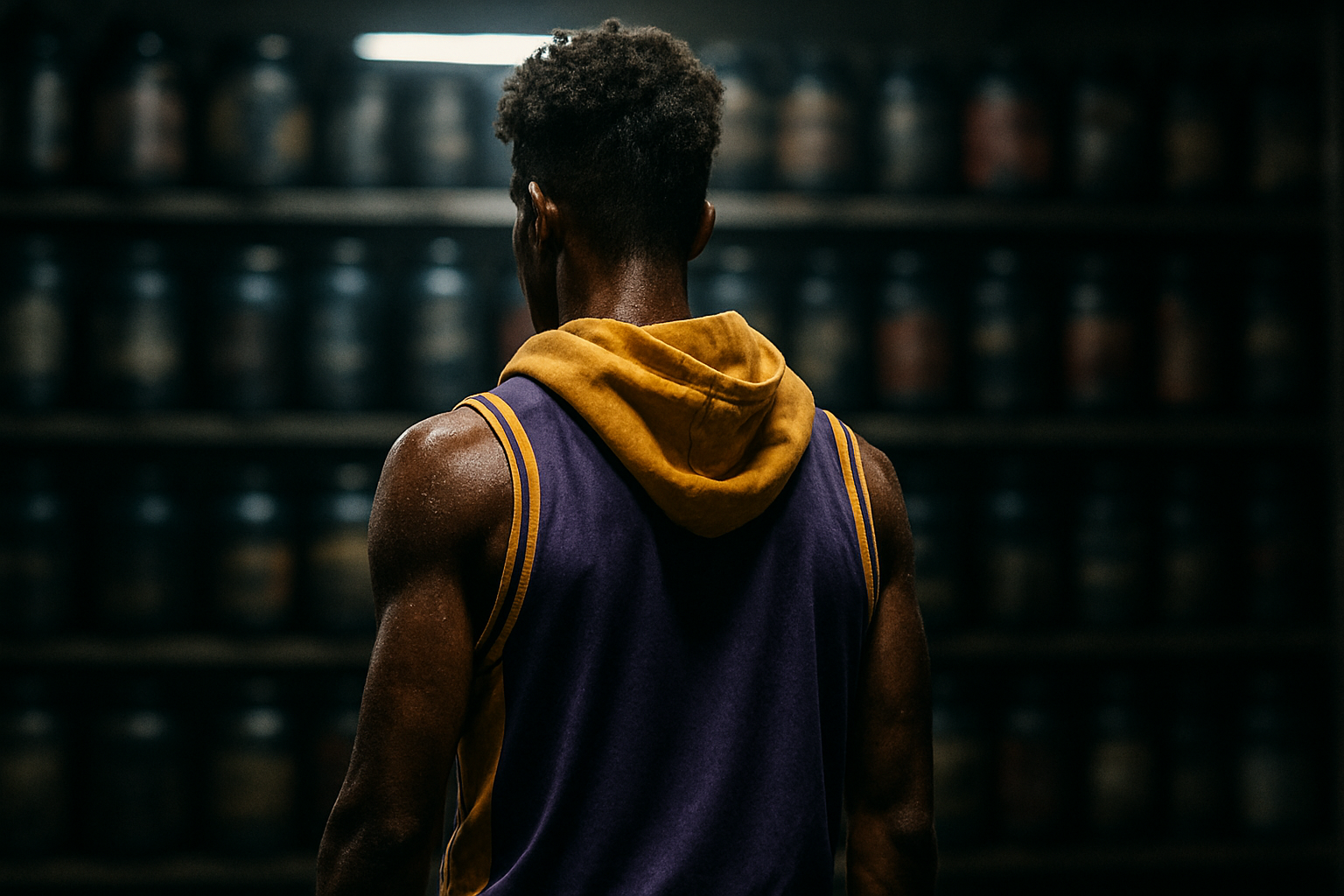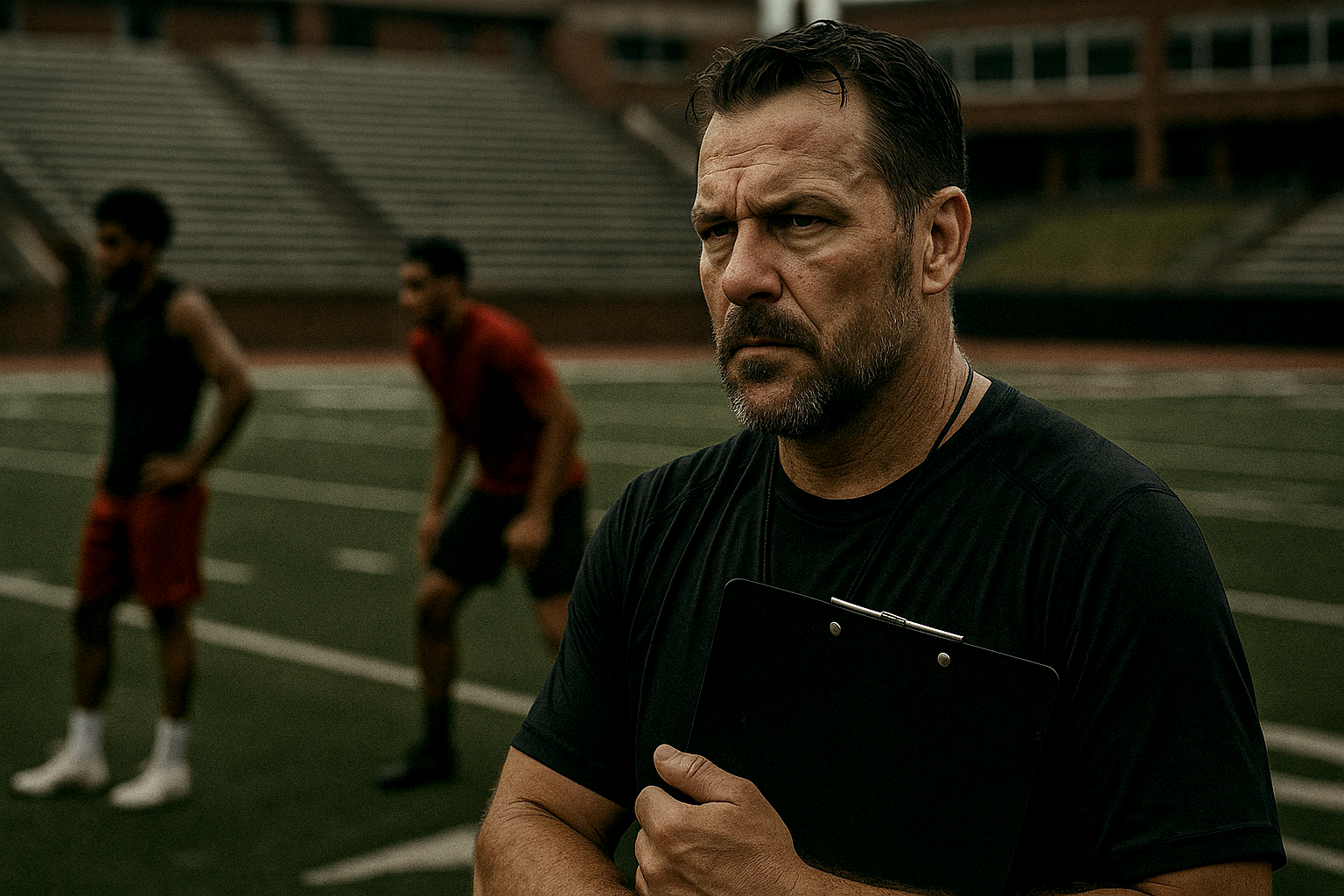Most athletes know food and supplements matter – they’ve heard it from coaches, teammates, and the internet. But knowing where to start? That’s where things fall apart. The space is flooded with hype, conflicting advice, and marketing disguised as science. No wonder so many athletes hesitate.
This guide cuts through the noise. It breaks down what’s actually proven to support performance – and what’s just shiny packaging. No gimmicks, no silver bullets. Just real talk on how to fuel your body, back up your training, and stay in the game longer.
WHAT DRIVES PEAK ATHLETIC PERFORMANCE
Peak athletic performance happens when your body and mind work together at their highest level. It's not just about talent or effort – it's about how well your training, recovery, nutrition, mindset, and supplements work together.
Think of athletic performance like a pyramid. Each level supports the next, and without a strong base, the top can't hold.

Performance Pyramid:
- Mindset: The foundation – affects focus, consistency, and how you handle pressure
- Nutrition: Fuels your growth – provides energy, protein, and nutrients for repair
- Recovery: Keeps you going – heals you through sleep, rest, and stress reduction
- Training: Levels you up – includes strength work, conditioning, and sport practice
- Supplements: The final piece that can support – but not replace – other layers
Many young athletes feel pressure to find fast results. Some look for shortcuts to outperform others or speed up muscle growth. But skipping steps in this pyramid often leads to disappointment or injury.
Understanding this structure helps you make better choices about what your body really needs to improve.
SHOULD ATHLETES TAKE SUPPLEMENTS OR EMPHASIZE WHOLE FOODS?
Most sports nutrition experts recommend a "food first" approach. This means getting nutrients from whole foods (fruits, vegetables, meats, grains) before considering supplements.
Supplements are concentrated forms of nutrients in pills, powders, or drinks. They include protein powders, vitamins, creatine, and caffeine. While they can be helpful in certain situations, they don't provide the complete nutritional value of whole foods.
Young athletes often face time challenges with school, practice, and homework. Some skip meals or eat on the go. In these cases, supplements might help fill nutrition gaps when meal timing is limited.
Comparison: Whole Foods vs. Supplements
- Absorption
- Whole foods: generally better absorbed
- Supplements: varies depending on product
- Nutrient variety
- Whole foods: complete range of nutrients
- Supplements: limited, isolated compounds
- Cost over time
- Whole foods: better long-term value
- Supplements: often expensive for quality
- Convenience
- Whole foods: requires planning
- Supplements: quick and portable
- Safety
- Whole foods: generally very safe
- Supplements: quality and contamination concerns
Whole foods typically allow your body to absorb nutrients better. Supplements vary in quality and sometimes carry risks of contamination, especially if they aren't third-party tested.
Not every athlete needs supplements. Consider them when you have a specific performance goal, a nutrient deficiency, or when you can't eat enough whole foods to support your training.
NUTRITIONAL SPORTS SUPPLEMENTS BACKED BY RESEARCH
The supplement space is crowded with hype – but a few stand out for one reason: they actually work. For athletes trying to train harder, recover faster, and push limits without wasting time or money, here are four performance-boosters backed by real science.
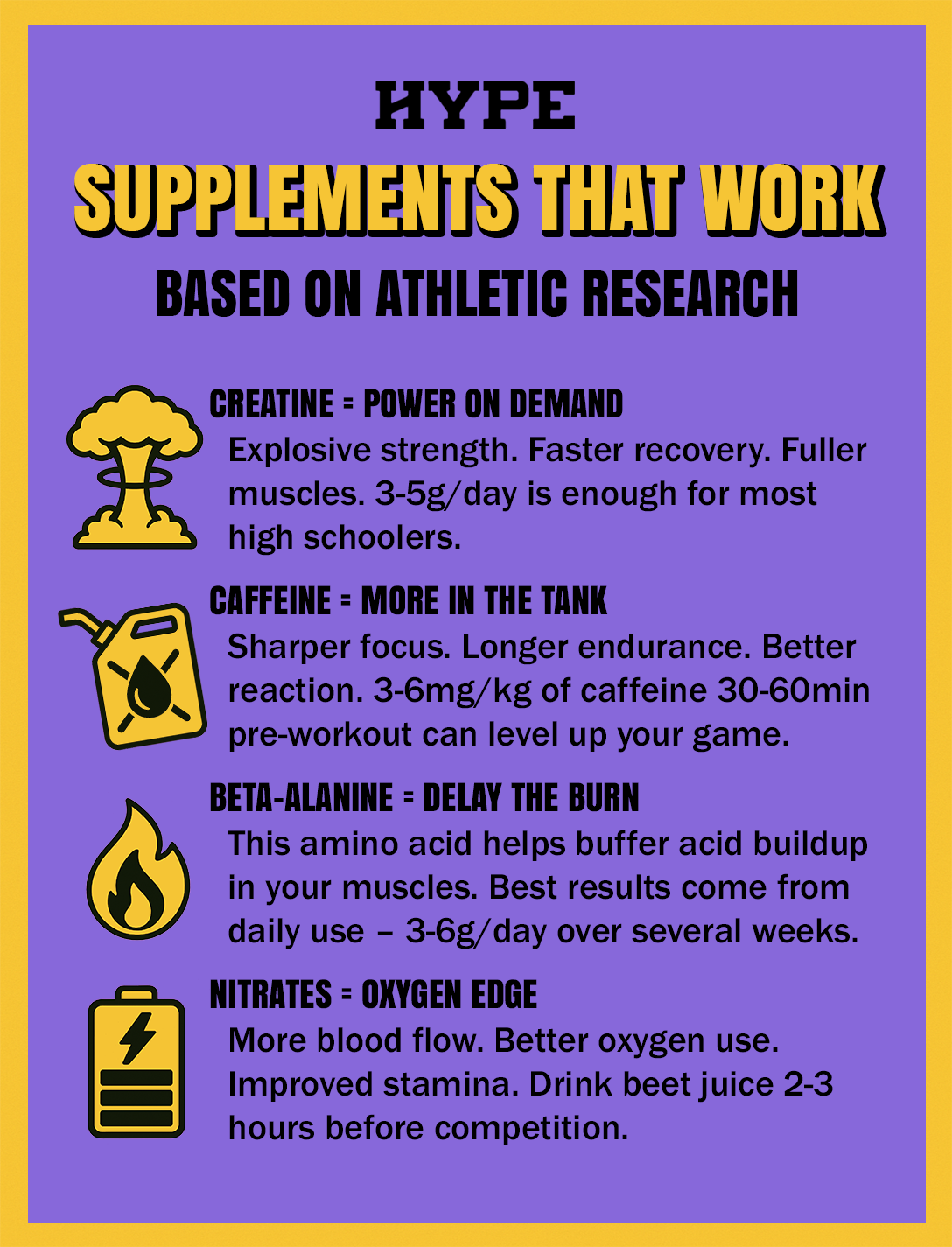
TLDR – Top supplements that work for athletes
1. Creatine = power on demand
Explosive strength. Faster recovery. Fuller muscles. Creatine monohydrate is the most researched and most effective – especially in sports like sprinting, football, and wrestling. 3-5g/day is enough for most high schoolers. Skip the bro-science; this stuff actually works.
2. Caffeine = more in the tank
Sharper focus. Longer endurance. Better reaction time. Just 3-6mg/kg of caffeine, taken 30-60 minutes pre-workout, can level up your game. But abuse it and it backfires: jitters, heart race, or wrecked sleep. Respect the timing.
3. Beta-alanine = delay the burn
This amino acid helps buffer acid buildup in your muscles, which delays fatigue during 1-4 minute all-out efforts (think 400m sprints or hard swim sets). Best results come from daily use – 3-6g/day over several weeks.
4. Nitrates (like beet juice) = oxygen edge
More blood flow. Better oxygen use. Improved stamina. Perfect for endurance athletes and anyone training in low-oxygen settings. Drink beet juice 2-3 hours before competition. It’s weird, but it works.
Bottom line:
No supplement replaces sleep, training, nutrition, or recovery – but these four can actually push performance when everything else is dialed in. Don't waste money on hype. Invest in what’s proven.
1. CREATINE FOR POWER
Creatine is a compound found naturally in muscles and foods like meat and fish. It helps your body produce energy for short, powerful movements.
Creatine monohydrate is the most studied form. Research shows it can improve strength and muscle mass, especially in sports requiring explosive power like football, sprinting, and weightlifting.
How it works: Creatine increases phosphocreatine in your muscles, which helps regenerate ATP – your body's main energy source for quick bursts of activity.
For high school athletes, a lower daily dose of 3-5 grams is typical. College athletes might use a loading protocol of 20 grams daily (divided into 4 servings) for 5-7 days, followed by 3-5 grams daily for maintenance.
Benefits of creatine:
- Increased power output during short, intense efforts
- Enhanced recovery between training sessions
- Potential brain performance improvements
- Added water in muscle cells, creating fuller appearance
Creatine works best for sports with short bursts of high intensity like track sprints, football, and wrestling. It's considered safe when used properly, despite myths about kidney damage or dehydration that aren't supported by research.
2. CAFFEINE FOR ENDURANCE
Caffeine is a stimulant found in coffee, tea, and some supplements. It works by blocking brain receptors that make you feel tired, leading to increased alertness and less perceived effort during exercise.
Research shows caffeine can improve endurance, reaction time, and concentration. The most effective dose is 3-6 milligrams per kilogram of body weight, taken 30-60 minutes before activity.
Practical caffeine tips:
- Timing matters: Take 30-60 minutes before competition
- Consider the source: Coffee and tea work well as alternatives to pills
- Watch the clock: Avoid late-day caffeine to prevent sleep problems
- Individual responses vary: Some athletes are more sensitive than others
Using caffeine regularly can reduce its effects over time. Some athletes cycle off caffeine periodically to maintain sensitivity.
Side effects can include jitters, rapid heartbeat, or sleep problems – especially in younger or caffeine-sensitive individuals.
3. BETA ALANINE AND NITRATE
Beta-alanine is an amino acid that helps buffer acid buildup in muscles during intense exercise. This can delay fatigue during high-intensity efforts lasting 1-4 minutes.
Nitrate (found in beet juice) converts to nitric oxide in the body, which improves blood flow and oxygen delivery to muscles during endurance activities.
Quick guide to beta-alanine:
- Beta-alanine works for: Activities lasting 1-4 minutes (400m runs, swimming races)
- Beta-alanine protocol: 3-6g daily for at least 4 weeks (loading period required)
Quick guide to nitrate:
- Nitrate helps with: Endurance events where oxygen efficiency matters
- Nitrate timing: Beet juice 2-3 hours before exercise
Beta-alanine may cause harmless tingling sensations when taken in larger doses. Splitting doses throughout the day can reduce this effect.
Nitrate is most effective for endurance athletes and those training in low-oxygen environments. Beet juice is a common, natural source.
VITAMINS FOR SPORTS & RECOVERY
Athletes often need more vitamins and minerals than non-athletes because of increased energy use, sweat loss, and muscle repair needs.
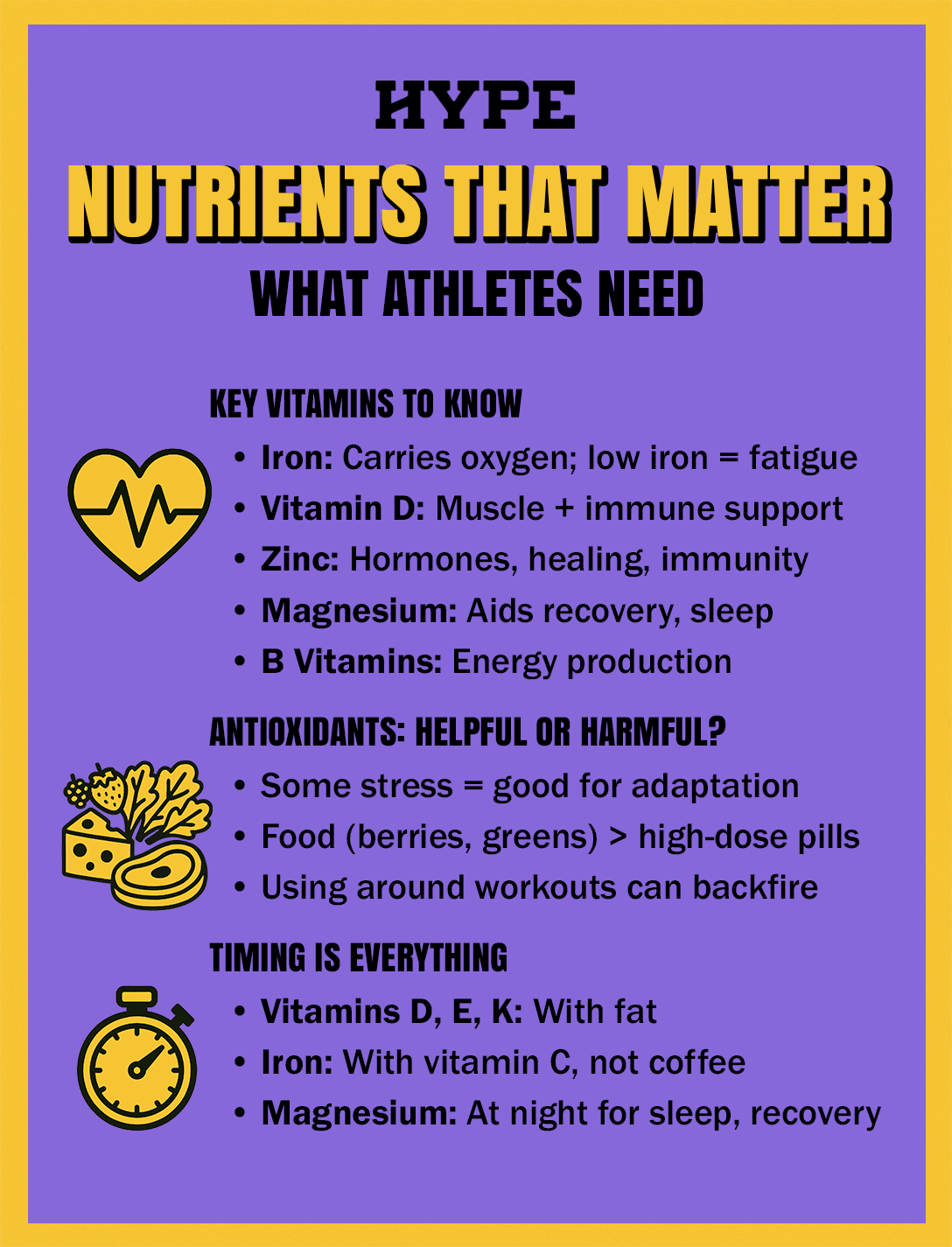
TLDR – Vitamins that actually matter for athletes
1. Key vitamins to know
- Vitamin D: Muscle + immune support; low in winter/indoor athletes
- B Vitamins: Energy production + red blood cells
- Iron: Carries oxygen; low iron = fatigue
- Magnesium: Aids recovery, sleep, and muscle function
- Zinc: Hormones, healing, immunity
2. Antioxidants: helpful or harmful?
- Some stress = good for adaptation
- Real food (berries, greens) > high-dose pills
- Over-supplementing around workouts can blunt progress
3. Timing is everything
- D, E, K: With fat
- Iron: With vitamin C, not coffee
- Magnesium: At night for sleep and muscle calm
1. ATHLETIC VITAMINS AND MINERALS
Several vitamins and minerals directly impact athletic performance through their roles in energy production, oxygen transport, and muscle function.
Key nutrients for athletes:
- Vitamin D: Supports bone health, immune function, and muscle performance. Low levels are common in winter or for indoor athletes.
- B vitamins: Help convert food to energy and produce red blood cells. Found in whole grains, meat, eggs, and leafy vegetables.
- Iron: Carries oxygen in blood. Iron deficiency can cause fatigue and reduced endurance, especially in female athletes who menstruate.
- Magnesium: Supports muscle contraction and recovery. Found in nuts, seeds, and leafy greens.
- Zinc: Helps with hormone production, immune function, and protein synthesis. Found in meat, dairy, and legumes.
Signs of deficiency might include unusual fatigue, frequent illness, poor recovery, or declining performance. Blood tests can help identify specific deficiencies.
High school athletes with varied diets may not need supplements. College athletes with higher training loads or dietary restrictions might have more specific needs.
2. ANTIOXIDANTS & THEIR EFFECTS
Antioxidants neutralize free radicals – unstable molecules produced during exercise that can damage cells. However, some free radical activity actually signals your body to adapt and get stronger.
Common antioxidants include vitamin C, vitamin E, and compounds in colorful fruits and vegetables.
Antioxidant facts vs. myths:
- Fact: Some oxidative stress helps trigger fitness improvements
- Myth: Taking high-dose antioxidant supplements always helps recovery
- Reality: Antioxidant supplements taken immediately around workouts may reduce training benefits
Food sources of antioxidants (like berries, colorful vegetables, and spices) provide a balanced mix without interfering with training adaptations.
Supplement-based antioxidants might be helpful during periods of high stress, travel, or increased illness risk, but timing matters.
3. TIMING OF VITAMIN SUPPLEMENTS
When you take certain vitamins and minerals affects how well your body absorbs and uses them.
Smart supplement timing:
- Fat-soluble vitamins (A, D, E, K) absorb better with meals containing healthy fats
- Iron absorbs poorly with calcium or coffee but better with vitamin C sources
- Magnesium taken in the evening may help with muscle relaxation and sleep
- Vitamin D levels often drop in winter, making supplementation more important then
During competition periods, supplement timing might shift to match travel schedules or energy needs. During regular training, consistency matters more than perfect timing.
Signs that you might need to adjust timing include digestive discomfort, low blood levels despite supplementation, or interference with other nutrients.
ATHLETE SUPPLEMENTS & SAFETY CONSIDERATIONS
Too many young athletes walk into the supplement world blindfolded – trusting what’s on the label, what a teammate recommends, or what a flashy TikTok ad claims. But the truth is: what you put in your body could cost you your spot on the team or even your health. Between banned substances, sketchy labels, and the myth that more is better, the risks are real. Here’s how to know what’s legal, what’s ethical, and what’s just dangerous.
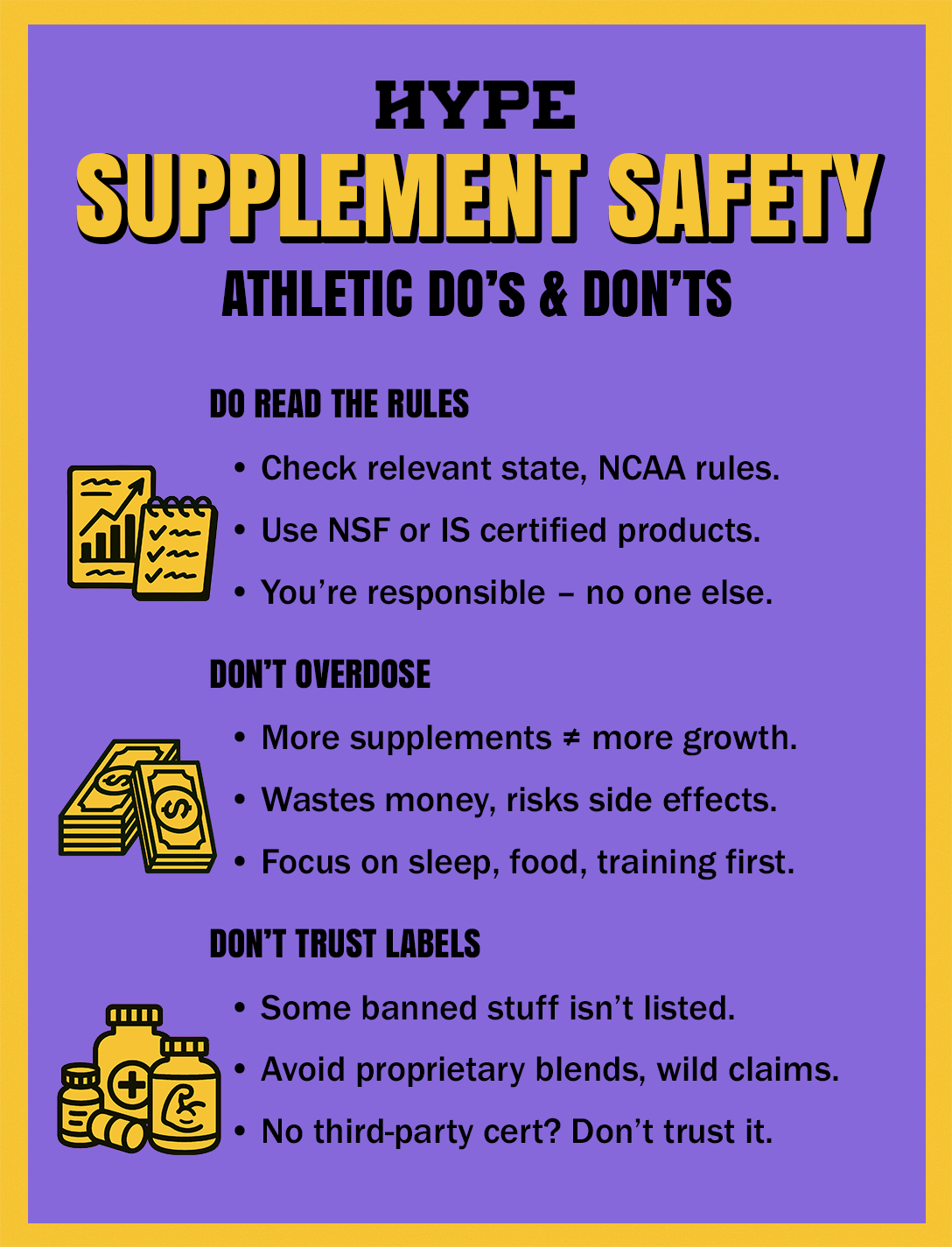
TLDR – Supplement safety tips for athletes
1. Read the rules
- High school = state rules. College = NCAA.
- Use only NSF or Informed Sport certified products.
- You’re responsible – not your coach or teammate.
2. Don’t overdose
- More supplements ≠ more performance.
- Too much = wasted money, side effects, or dependence.
- Dial in sleep, food, and training first.
3. Labels lie
- Some banned stuff isn’t listed.
- Avoid “proprietary blends” and wild claims.
- No third-party cert? Don’t trust it.
Bottom line:
Supplements aren’t shortcuts. They’re last-layer tools – not your foundation.
1. LEGAL AND ETHICAL GUIDELINES
Athletic organizations have specific rules about supplements. High school athletes follow state athletic association guidelines, while college athletes follow NCAA regulations.
Some supplements contain banned ingredients that could result in a positive drug test – even if you didn't know they were there. Third-party testing reduces this risk.
Trusted certification programs:
These organizations regularly test products for banned substances, correct labeling, and proper dosage.
Athletes are responsible for what they put in their bodies, even if a coach or teammate recommends a product. Before using any supplement, talking with parents, coaches, or health professionals helps avoid problems.
2. OVER SUPPLEMENTATION RISKS
Taking too many supplements or using them incorrectly can cause health problems, waste money, or create psychological dependence.
Excessive amounts of certain nutrients can be toxic. Some pre-workout supplements contain high stimulant doses that affect heart rate and blood pressure.
Warning signs of supplement overuse:
- Spending too much money on multiple products
- Taking more than recommended amounts
- Feeling like you can't perform without supplements
- Continuing use despite side effects
- Hiding supplement use from coaches or parents
Athletes who rely heavily on supplements might overlook more effective strategies like quality training, adequate sleep, or proper nutrition.
3. BLIND SPOTS IN DOPING REGULATIONS
Some supplements contain ingredients not listed on the label. These "gray area" supplements might contain banned substances even if the label looks clean.
Contamination happens during manufacturing when equipment is shared between different products. This can lead to unintentional positive drug tests.
Risk factors to watch for:
- Products made in countries with weak regulations
- "Proprietary blends" that don't disclose exact ingredients
- Aggressive marketing claims like "extreme muscle growth"
- Products marketed as "alternatives" to banned substances
- No third-party testing certification
"Natural" doesn't mean safe or allowed in sports. Some banned substances come from plants or herbs. Athletes can reduce risk by researching brands, checking for third-party certifications, and avoiding products with exaggerated claims.
LEVEL UP WITH THE RIGHT GAME PLAN
Making smart choices about supplements starts with understanding your specific goals and matching them with evidence-based options.

How athletes should choose a supplement:
- Identify your specific performance goals
- Make sure training, recovery, and nutrition are solid first
- Research supplements with evidence for your particular needs
- Try one supplement at a time to clearly track effects
- Keep records of how you feel, perform, and recover
- Adjust based on what you observe
Building a support team helps with making informed decisions. This might include a sports nutritionist, coach, athletic trainer, or healthcare provider who understands your sport.
Your needs will change over time as you progress through seasons, school years, and competition levels. What works now might need adjustment later.
OWN YOUR FUEL CHOICES
Supplements can help – but only if the rest of your game is already dialed. Chasing shortcuts without building the base will leave you frustrated, overtrained, or sidelined. So build the foundation first: eat real food, train smart, sleep deep, recover well. Then, if there’s a true need, layer in evidence-backed support.
FAQS ABOUT SUPPLEMENTS, DIETS, AND ATHLETIC PERFORMANCE
HOW DO I KNOW IF A PARTICULAR SUPPLEMENT IS RIGHT FOR MY SPORT?
Research whether the supplement's effects match your sport's energy demands – creatine helps with explosive power sports like sprinting, while caffeine benefits endurance events like distance running – then consider your individual goals, health status, and budget before testing one supplement at a time while monitoring results.
WHAT SUPPLEMENTS SHOULD TEENAGE ATHLETES SPECIFICALLY AVOID?
Teenage athletes should avoid supplements with hormonal effects (SARMs, prohormones), stimulant-heavy pre-workouts, weight-loss compounds, and any products lacking third-party testing certification, as these pose significant health and eligibility risks during important developmental years.
HOW CAN I BALANCE MENTAL HEALTH WITH PHYSICAL PERFORMANCE WHILE USING SUPPLEMENTS?
Balance performance goals with overall wellbeing by prioritizing sleep quality, practicing mindfulness techniques, connecting with supportive peers, and using tools that address both physical and mental aspects of athletic development rather than focusing exclusively on supplement-driven performance metrics.
